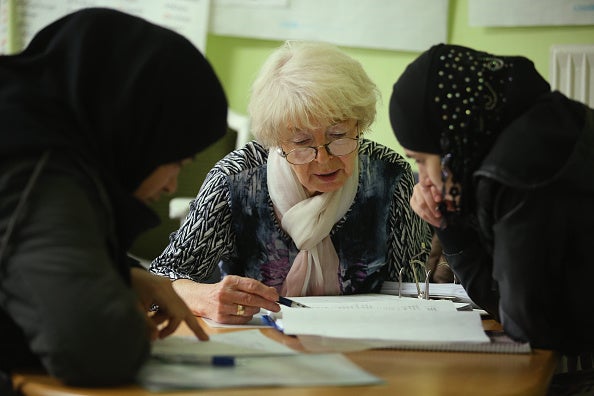University of Leicester offers free English language lessons to displaced refugees
'Helping those in the local community who need support is something universities ought to do,' says director of university's English language unit

Your support helps us to tell the story
From reproductive rights to climate change to Big Tech, The Independent is on the ground when the story is developing. Whether it's investigating the financials of Elon Musk's pro-Trump PAC or producing our latest documentary, 'The A Word', which shines a light on the American women fighting for reproductive rights, we know how important it is to parse out the facts from the messaging.
At such a critical moment in US history, we need reporters on the ground. Your donation allows us to keep sending journalists to speak to both sides of the story.
The Independent is trusted by Americans across the entire political spectrum. And unlike many other quality news outlets, we choose not to lock Americans out of our reporting and analysis with paywalls. We believe quality journalism should be available to everyone, paid for by those who can afford it.
Your support makes all the difference.The University of Leicester has opened its doors to help displaced refugees overcome one of the most difficult challenges they face when seeking sanctuary in the West by providing something invaluable - English language lessons.
Teachers from the institution’s English Language Teaching Unit (ELTU) have been offering up their expertise, training for volunteers who have less classroom experience, and the use of university facilities also - all free of charge.
According to the Leicester City of Sanctuary - part of a national movement with nearly 40 groups which are committed to developing a “culture of welcome and inclusion” for people seeking sanctuary in the UK - the refugees, who have fled war and persecution in countries from across the globe, receive £36 a week to live on once here, reported ITV News.
The price of private tuition would be at around £60 a term, a cost which the news programme described as being “way beyond their means.”
Philip Horspool, director of the university’s ELTU, described how Leicester has, for a long time, been a city that welcomes refugees. He added: “With the current situation in Europe, the city is likely to welcome increased numbers in the coming months and years.
“Language is one of the many challenges that face those who leave their own country and, in the ELTU, we have the expertise and desire to help those whose first language is not English.”
The students, however, are fearing for the lives of their families back in their home countries and told ITV News they wished to remain anonymous about the fact they have been receiving the lessons.
One man, from Eritrea in Africa, told the news programme how learning English at the university has had many advantages for him, such as communicating with the people he lives with, also acknowledging how English is needed in his quest to find work.
However, the man added: “In my country, at this moment, it is so difficult to enjoy expression of opinion. People are arrested - or beaten.” He also added how he would be in “serious harm” if he went back to Eritrea.
Despite this, Mr Horspool highlighted how other institutions should follow in Leicester’s footsteps and said: “I believe helping those in the local community who need support is something universities ought to do, and I’m delighted that, in a small way, we can offer our expertise and facilities to Leicester City of Sanctuary.”
Looking ahead at the initiative’s outcome, he added: “We hope this support will expand and that it will have a positive impact on the lives of those who are living through a difficult period in their lives.”
The first two-hour class took place on 5 November and will continue on a weekly basis.
Additional classes will now also be run on Monday and Tuesday evenings to support, in the region of, 100 refugees.
The ELTU also added that classes are open to all levels from beginner to advanced, and are run by volunteers.
Join our commenting forum
Join thought-provoking conversations, follow other Independent readers and see their replies
Comments